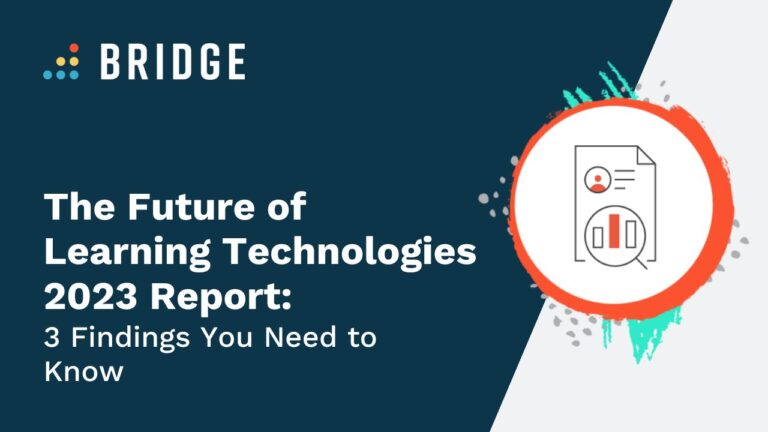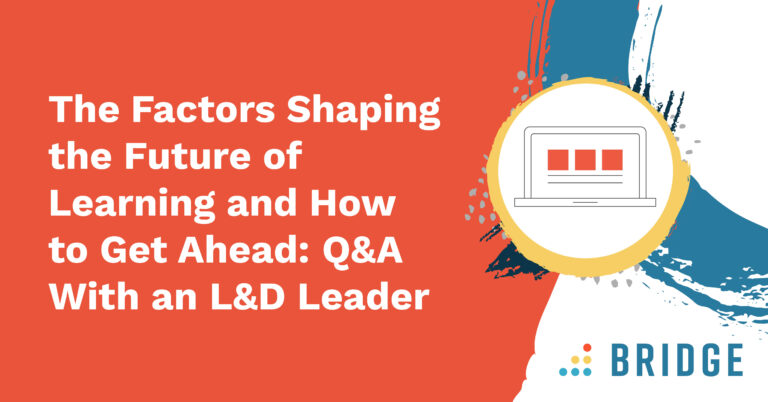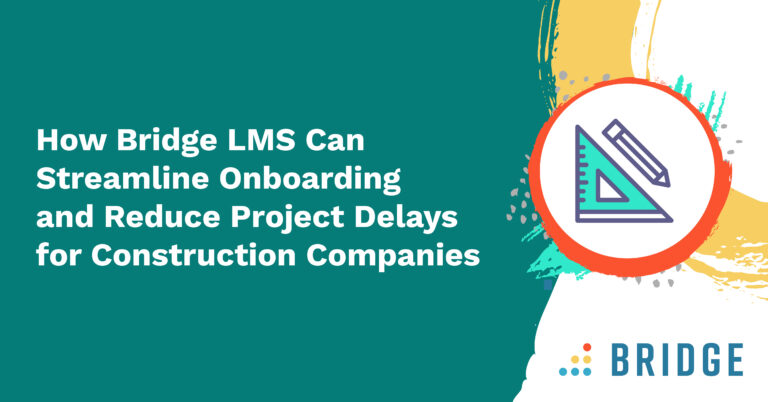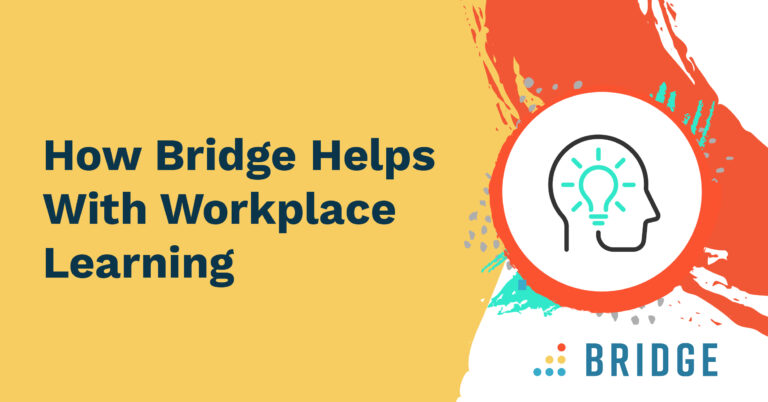Bridge partnered with the HR Research Institute to discover the drivers, limitations, and future expectations surrounding learning technologies. The result? A comprehensive report drawn from the survey responses of 256 HR professionals. These respondents represent a range of industries and company sizes, resulting in research that covers a wide cross-section of the people who understand learning systems best.
While the full report, titled “The Future of Learning Technologies 2023,” covers an array of topics including course creation and employee performance, we’ve put together a few highlights based on some of the report’s more urgent findings.
Keep reading to get the lowdown on:
- The drivers that animate today’s learning programs
- A clear and growing need for personalization and collaboration
- The appetite for learning tech integration among HR professionals
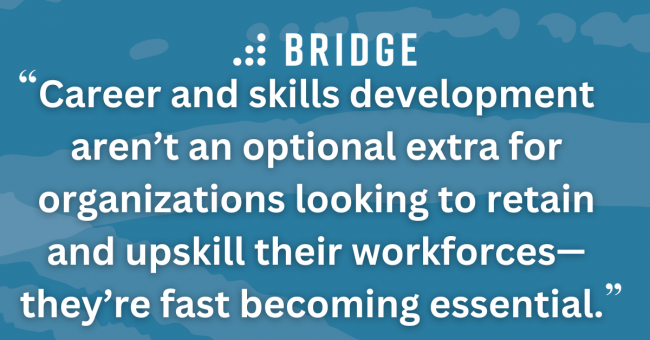
1) Skill and Career Development Are the Top Drivers for Learning
When asked about the most important factors driving learning in their organizations, our respondents put employee career development front and center. A decisive 62% included career development among the key factors motivating their L&D programs, followed by new skills development in second place.
Looking ahead to the future, a strikingly similar proportion—59%, in fact—voiced their expectation that future changes to learning technologies will involve better career development capabilities. Similarly, respondents’ follow-up expectation was that learning tech will place more of an emphasis on skills-based learning and development.
These are some consistent preoccupations—but why might career and skills development be seen as bigger learning motivators than mandatory learning like compliance training?
Well, the evidence suggests that career and skills development aren’t an optional extra for organizations looking to retain and upskill their workforces—they’re fast becoming essential. For example, there’s now growing recognition that internal movement increases employee retention. That’s the counter-intuitive truth about facilitating career development. It isn’t a way to propel your people elsewhere, but a vital mechanism for ensuring they’ll stick around for the long haul.
There’s a similar story to be told in the world of skills development. According to the World Economic Forum, 44% of workers’ skills are expected to change over the next five years. With this kind of disruption on the table, it’s no wonder that our respondents are reflecting on how to keep every worker up to date with the latest skills requirements.
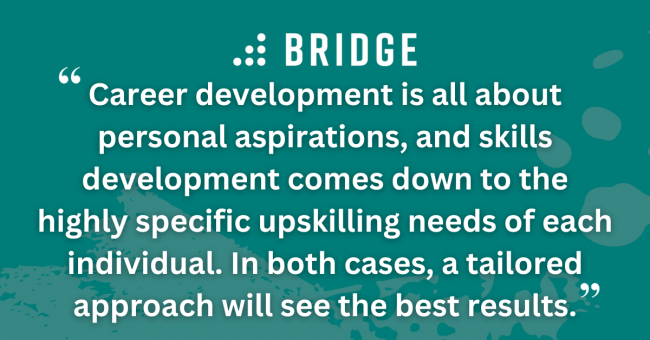
MORE FROM THE BLOG | ‘How to Build a Job Architecture With AI-Assisted Skills Matching’
2) Personalization and Collaboration Are the Future of Learning Tech
While respondents predicted better skills and career development as the top future learning tech advances, two other expectations were hot on their heels. 45% said learning will be personalized, and 43% expected to see more integrated social and collaborative learning features.
It’s no surprise that personalization has been highlighted in a report that also features career and skills development so prominently. Career development is all about personal aspirations, and skills development comes down to the highly specific upskilling needs of each individual. In both cases, a tailored approach will see the best results.
Meanwhile, when it comes to collaborative learning, our survey has found that these future expectations reflect present-day deficiencies. 46% of our respondents feel that their learning systems have limited collaboration functionality, and 37% said their learning system doesn’t have any of the collaboration features named in the survey.
With that in mind, we think the future of learning tech involves a mixture of personalization and collaboration. That’s why our upskilling platform, Skills Plus, allows learners to identify the specific skills they need to excel in their existing roles and identify communities of colleagues who also have interests or expertise in the same skills.
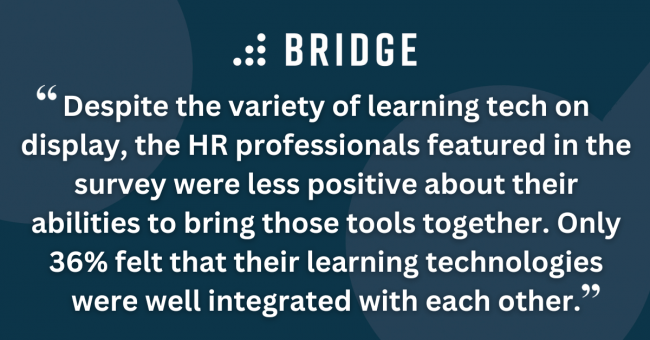
BEST PRACTICES FOR COACHING AND MENTORING | ‘3 Elements of a Successful Mentorship Program’
3) Learning Technologies Need to Be Better Integrated With One Another
Integration, in one form or another, was a running theme across the report. That’s not a huge shock—especially when you look at the variety of learning technologies our respondents have been wrangling. When asked to select all the learning technologies used by their organizations, large proportions of the respondent pool pointed to:
- Learning management systems (72%)
- Virtual instructor-led training or webinars (64%)
- Video learning tools (52%)
These popular choices were accompanied by a smaller (but still significant!) selection of related technologies, including mobile learning tools. However, despite the variety of learning tech on display, the HR professionals featured in the survey were less positive about their abilities to bring those tools together. Only 36% felt that their learning technologies were well integrated with each other. Plus, though there was no clear majority answer to this question, poor integration capabilities feature among the top three weaknesses our respondents identified in their learning systems.
At the same time, the report suggests that there’s an appetite for integration among its respondents. 47% of the HR professionals in question reported having a single portal or software to access their learning tech—and, if you just count small-to-medium businesses, that figure rises to 53%. This tells us that plenty of HR professionals gravitate toward a unified approach to accessing and using learning tech.
Some of these “single portal” answers will include organizations that only have one or two standalone solutions. However, the report points out that some of those standalone options will take the form of all-in-one platforms like Bridge, incorporating a variety of tools within a single location. As such, it’s clear that (one way or another) HR professionals want a fully integrated learning tech experience—provided they can find the right platform.
GET THE LOWDOWN ON INTEGRATION | ‘How to Pitch HR Tech to Your IT Team’
Discover the Future of Learning Tech (And How Bridge Is Rising To Meet It)
Explore all five major findings and discover what the future of learning technology looks like in our comprehensive report. Want to meet your current and future learning tech requirements? Request a demo and discover how Bridge’s deeply integrated, all-in-one learning and performance platform can keep your learners on track for success.
